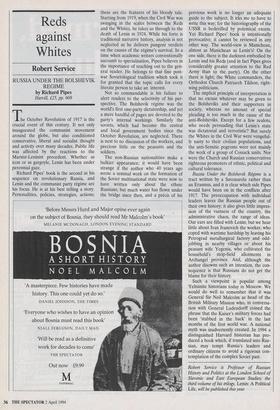Reds against Whites
Robert Service
RUSSIA UNDER THE BOLSHEVIK REGIME by Richard Pipes Harvill, £25, pp. 608 The October Revolution of 1917 is the crucial event of this century. It not only inaugurated the communist movement around the globe, but also conditioned conservative, liberal and socialist thought and activity over many decades. Public life was affected by the reactions to the Marxist-Leninist precedent. Whether as icon or as gargoyle, Lenin has been under perennial gaze.
Richard Pipes' book is the second in his sequence on revolutionary Russia, and Lenin and the communist party regime are his focus. He is at his best telling a story. Personalities, policies, strategies, actions; these are the features of his bloody tale. Starting from 1919, when the Civil War was swinging in the scales between the Reds and the Whites, he takes us through to the death of Lenin in 1924. While his forte is traditional narrative history, analysis is not neglected as he delivers pungent verdicts on the causes of the regime's survival. In a time when academic writers conventionally succumb to specialisation, Pipes believes in the importance of reaching out to the gen- eral reader. He belongs to that fine post- war Sovietological tradition which took it for granted that the topic calls for every literate person to take an interest.
Not so commendable is his failure to alert readers to the selectivity of his per- spective. The Bolshevik regime was the world's first one-party dictatorship, and yet a mere handful of pages are devoted to the party's internal workings. Similarly the soviets, which had become the central and local government bodies since the October Revolution, are neglected. There is next to no discussion of the workers, and precious little on the peasants and the soldiers.
The non-Russian nationalities make a bulkier appearance; it would have been strange if the author who 40 years ago wrote a seminal work on the formation of the Soviet multinational state were now to have written only about the ethnic Russians; but much water has flown under the bridge since then, and a précis of his previous work is no longer an adequate guide to the subject. It irks me to have to write this way; for the historiography of the USSR is bedevilled by polemical excess. Yet Richard Pipes' book is intentionally provocative; it cannot be reviewed in any other way. The world-view is Manichean, almost as Manichean as Lenin's! On the one side, there is the darkness embodied by Lenin and his Reds (and in fact Pipes gives considerably greater attention to the Red Army than to the party). On the other there is light; the White commanders, the Orthodox Church Patriarch Tikhon, right- wing politicians.
The implicit principle of interpretation is that no excuse whatever may be given to the Bolsheviks and their supporters in society, whereas no amount of special pleading is too much in the cause of the anti-Bolsheviks. Except for a few zealots, who needs persuading that Lenin's state was dictatorial and terroristic? But surely the Whites in the Civil War were vengeful- ly nasty to their civilian populations, and the anti-Semitic pogroms were not mainly the work of a group of Cossack units. Nor were the Church and Russian conservatives righteous promoters of ethnic, political and cultural tolerance.
Russia Under the Bolshevik Regime is a tract written by a Savonarola rather than an Erasmus, and it is clear which side Pipes would have been on in the conflicts after 1917. The preoccupation with individual leaders leaves the Russian people out of their own history; it also gives little impres- sion of the vastness of the country, the administrative chaos, the range of ideas. Our ears are filled with Lenin; but we hear little about Ivan Ivanovich the worker, who coped with wartime hardship by leaving his Petrograd metallurgical factory and odd- jobbing in nearby villages or about his peasant wife Yegenia, who cultivated the household's strip-field allotments in Archangel province. And, although the author disowns such an intention, the con- sequence is that Russians do not get the blame for their history.
Such a viewpoint is popular among Yeltsinite historians today in Moscow. We would do well to remember that it was General Sir Neil Malcolm as head of the British Military Mission who, in conversa- tion with General Ludendorff coined the phrase that the Kaiser's military forces had been 'stabbed in the back' in the last months of the first world war. A national myth was inadvertently created. In 1994 a distinguished Harvard historian has pro- duced a book which, if translated into Rus- sian, may tempt Russia's leaders and ordinary citizens to avoid a rigorous con- templation of the complex Soviet past.
Robert Service is Professor of Russian History and Politics at the London School of Slavonic and East European Studies; the third volume of his trilogy, Lenin: A Political Life, will be published this year.


























































 Previous page
Previous page